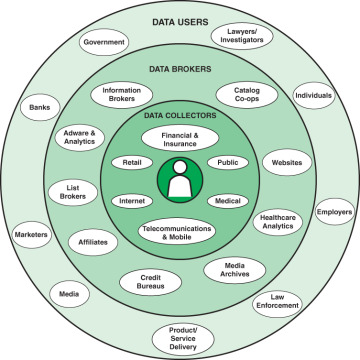Online Privacy: Threats and Requirements
- 8.1 The Online Ecosystem for Personal Data
- 8.2 Web Security and Privacy
- 8.3 Mobile App Security
- 8.4 Online Privacy Threats
- 8.5 Online Privacy Requirements
- 8.6 Privacy Notices
- 8.7 Tracking
- 8.8 Key Terms and Review Questions
- 8.9 References
A survey of threats, requirements, and approaches to online privacy.
A unique area of privacy—and one of the most challenging areas—is online privacy. This chapter uses the term online privacy to refer to privacy concerns related to user interaction with Internet services through web servers and mobile apps. This is a quite distinct topic from online access to queryable databases, discussed in Section 7.7 of Chapter 7, “Privacy in Databases.” Organizations need to be concerned about online privacy in two contexts:
Organizations need to maintain the privacy of personal information that they collect, directly or indirectly, from online activity of users.
Organizations need to be concerned about privacy protection for employees who engage in online activity with services outside the organization.
This chapter covers a variety of topics related to online security and privacy. Sections 8.1 through 8.3 provide a survey of security approaches for online web access and the use of mobile apps. These approaches provide some privacy protection but are inadequate by themselves to address all privacy concerns. Section 8.4 discusses online privacy threats. Then, Section 8.5 looks at online privacy requirements and a framework for responding to these requirements. Sections 8.6 and 8.7 look in more detail at two specific online privacy issues: privacy notices and tracking.
8.1 The Online Ecosystem for Personal Data
The World Wide Web (WWW) has rapidly expanded since its introduction in the 1990s to become a near-essential infrastructure for businesses, consumers, and other users. Users access services on the web, including purchasing goods and service, online financial transactions, search engines, web-based email, and forums. But the convenience brings privacy-related concerns. Websites collect personal information explicitly through a variety of means, including registration pages, user surveys, and online contests, application forms, and order forms. Websites also collect personal information through means that are not obvious to consumers, such as cookies and other tracking technologies.
The recent explosive growth in the number of mobile apps raises similar privacy concerns. Apps connect users to services that, as part of their operation, collect a substantial amount of personal information on the users.
Figure 8.1 illustrates the many players involved in the online collection and use of personal data [FTC12].

FIGURE 8.1 Personal Data Ecosystem
Figure 8.1 shows three categories of organizations involved:
Data collectors collect information directly from their customers, audience, or other types of users of their services.
Data brokers compile large amounts of personal data from a number of data collectors and other data brokers, without having direct online contact with the individuals whose information is in the collected data. Data brokers repackage and sell the collected information to various data users, typically without the permission or input of the individuals involved. Because consumers generally do not directly interact with data brokers, they have no means of knowing the extent and nature of information that data brokers collect about them and share with others for their own financial gain. Data brokers can collect information about consumers from a variety of public and nonpublic sources, including courthouse records, website cookies, and loyalty card programs. Typically, brokers create profiles of individuals for marketing purposes and sell them to data users.
The data users category encompasses a broad range. One type of data user is a business that wants to target its advertisements and special offers. Other uses are fraud prevention and credit risk assessment.
This privacy data ecosystem raises a number of privacy-related concerns. A 2013 report to the U.S. Senate [OOI13] made the following observations about data brokers involved in the collection and sale of consumer data specifically for marketing purposes:
Data brokers collect a huge volume of detailed information on hundreds of millions of consumers, including consumers’ personal characteristics and preferences as well as health and financial information. Beyond publicly available information such as home addresses and phone numbers, data brokers maintain data as specific as whether consumers view a high volume of YouTube videos, the type of cars they drive, ailments they may have (e.g., depression, diabetes), whether they are hunters, what types of pets they have, and whether they have purchased a particular shampoo product in the past six months.
Data brokers sell products that identify financially vulnerable consumers. Some brokers compile and sell consumer profiles that define consumers in categories, without consumer permission or knowledge of the underlying data. A number of these products focus on consumers’ financial vulnerability. The names, descriptions, and characterizations in such products likely appeal to companies that sell high-cost loans and other financially risky products to populations that are likely to need quick cash.
Data broker products provide information about consumer offline behavior to tailor online outreach by marketers. While historically marketers used consumer data to locate consumers to send catalogs and other marketing promotions through the mail or contact via telephone, increasingly the information data brokers sell marketers about consumers is provided digitally. Data brokers provide customers digital products that target online outreach to a consumer based on the dossier of offline data collected about the consumer.
Data brokers operate behind a veil of secrecy. Data brokers typically amass data without direct interaction with consumers, and a number of brokers perpetuate this secrecy by contractually limiting customers from disclosing their data sources. Brokers’ privacy policies vary widely regarding consumer access and correction rights regarding their own data.
Thus, organizations that are data brokers need to have privacy policies and technical mechanisms to ensure the privacy of data collected directly from individuals.